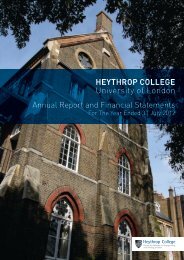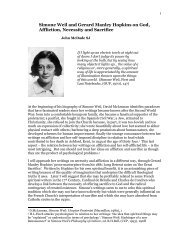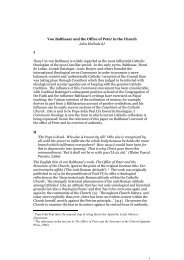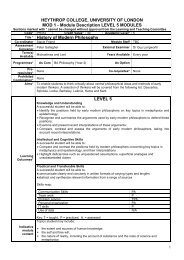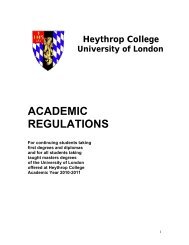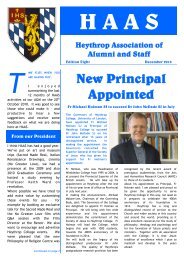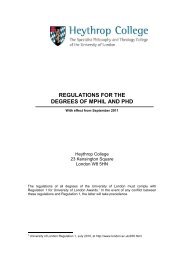Wallace_Stevens.pdf - Heythrop College
Wallace_Stevens.pdf - Heythrop College
Wallace_Stevens.pdf - Heythrop College
Create successful ePaper yourself
Turn your PDF publications into a flip-book with our unique Google optimized e-Paper software.
8<br />
imaginative idea satisfies the imagination. A rational idea may not satisfy the imagination, and an<br />
imaginative idea may not satisfy the mind, and you know where this is going:<br />
From this analysis, we deduce that an idea that satisfies both the reason and the<br />
imagination, if it happened, for instance to be an idea of God, would establish a divine<br />
beginning and end for us which, at the moment the reason, singly, at best proposes, and<br />
on which, at the moment, the imagination, singly merely meditates. 25<br />
The verbs here (‘proposes’ and ‘meditates’) are significant: all the mind can do is propose an idea<br />
for adjudication and rational acceptance, while all the imagination can do is meditate, presumably<br />
on the aesthetic quality of what is created; Most of the time (all of the time), they work<br />
separately, ‘singly’ not jointly.<br />
Later I will express doubts about the possibility of ‘speaking God’ at all in language unless there<br />
are strict, subversive controls in operation. I also wonder about the possible inclusion of God<br />
within ‘the real’ as <strong>Stevens</strong> and others construe it. My fear is that this would result in what,<br />
following Heidegger, is called ‘onto-theology’, the creation of a single category, ‘being’, in which<br />
God and the world are conceptually placed. But Deus non est in genere: God is not one item in a<br />
class of things. A great deal of modern atheism seems to treat God as a possible ‘fact’ within the<br />
world, as a ‘secondary cause’ alongside other (creaturely) secondary causes – a ‘fact’ of course to<br />
be rejected as unnecessary and fantastical. In an important sense, God does not add anything to<br />
the world, and if you are a Thomist, you will also hold that the world does not add anything to<br />
God. These points are true because the relation of God and the world cannot be viewed as an<br />
addition of one thing to another: you do not get a better account of the world by including God as<br />
an element in the account. If you include God as a feature in such an account, it can only be as a<br />
pointer to why the world is at all, not as a datum that alters other data. We may speak of ‘God and<br />
the world’ but God is not added to the world in the way that John is added to Mary to make two<br />
possibly happy people, nor does the world mark an ontological enhancement of God. The world is<br />
not alongside God in any serious sense other than in how we use words. 26<br />
What is difficult to see is how God might be, could ever possibly be, a fiction such as <strong>Stevens</strong><br />
thinks. Of course there are fictive gods whom we imagine, whom we create out of our metaphors<br />
and projections, whom we and others declare to be dead, but such gods are how we meet the<br />
meaning-creating dimension of ourselves and eventually come to be pleased, satisfied by what we<br />
imaginatively grasp about the real. But by definition, this is not the transcendent reality, the<br />
radically other goodness that is not an object in the world and therefore cannot be the object of<br />
our imagining. The god who might be the supreme fiction is created by our imagining; the<br />
condition of knowing the true God lies precisely in withdrawing God from the web of such<br />
imagining. Where, in an Idealist aesthetic, such as I suspect that <strong>Stevens</strong> offers, we are in touch<br />
with the supreme through the idea of the supreme, by contrast, classical theology, less tainted<br />
with romantic or philosophical idealism and keener to distinguish between ‘the real’ and ‘the idea<br />
of the real’, denies that having the idea of God gives you access to God at all. 27 Conceptio dei non<br />
est deus.<br />
25 CP, 668. The essay begins with his discussion, and rejection, of Pascal’s strict disjunction<br />
between reason and imagination.<br />
26 ‘In the phrase “God and the world”, the word “and” carries all the connotations of relatedness,<br />
dependence, communication, revelation, union, and a destiny of ultimate blessedness. The world<br />
is not alongside God but is grounded in God’s act, so in the phrase ‘God and the world’, ‘and’<br />
signals a deep relatedness’ (J.McDade, ‘Covenant in Christian-Jewish Relations’ unpublished<br />
paper on <strong>Heythrop</strong> Staff Webpage). In Aquinas’ terms, God’s action is ‘primary causality’; what<br />
things (and people) do is ‘secondary causality’; the key rule is that there is no conflict, contrast or<br />
binary opposition between primary and secondary causality as though the presence of one<br />
interferes with the operation of the other.<br />
27 ‘<strong>Stevens</strong> can be said to be offering a poetic transposition of transcendental idealism, where the<br />
relation between thought and things and words and world is re-described as the relation between



